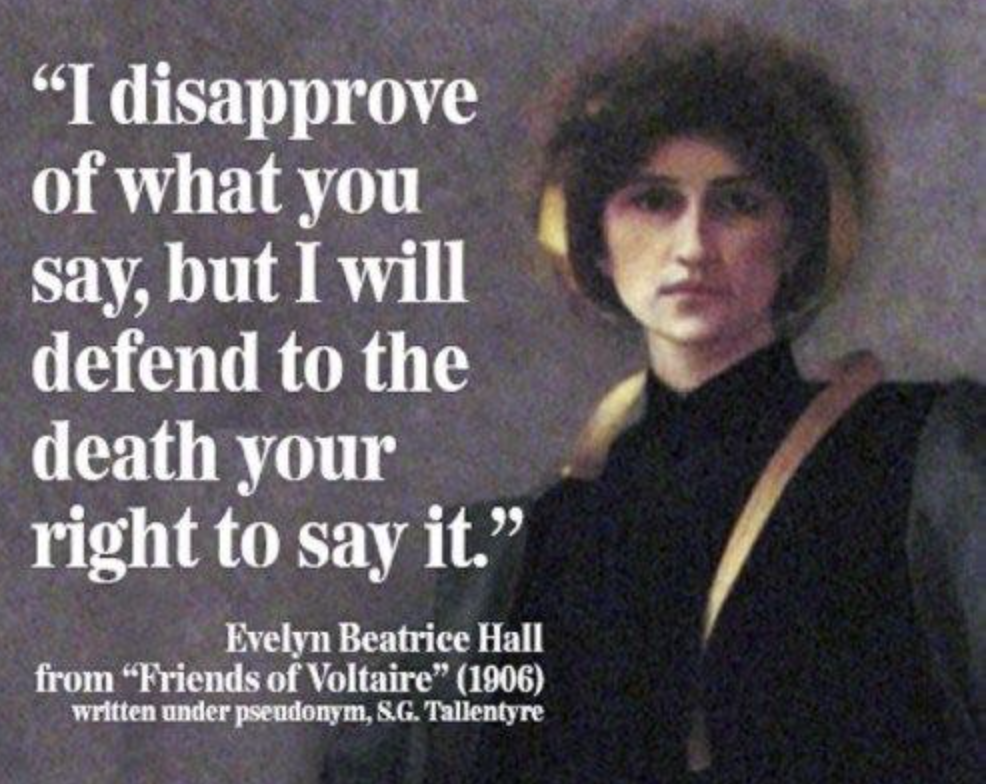“I disapprove of what you say, but I will defend to the death your right to say it.”
One of the most famous quotes of all time has been attributed to the French philosopher Voltaire, but he never actually said it.
Neither did Francois-Marie Arouet, although it’s possible Billy Voltaire said it as one of his final sounds.
Bonus points if you know who Billy Voltaire was. (Answer later)
Nope, it was Evelyn Beatrice Hall, writing about Voltaire in 1906, who used it to explain one of the most important tenets of a free society.
A free society, that is, that would be intelligent enough to remain free. A society where people understood that you could disagree with them without necessarily being wrong … or stupid … or evil.
In other words, a secular society.
“Evil” is basically a religious term, often used to describe people who aren’t good enough to believe what you believe. And the nice thing about it — for the people who throw the word around — is that it justifies almost any sort of tactics to oppose it.
There have always been people who see their political opponents as evil, but they have usually been on the fringes. One exception was the first half of the 19th century, when abolitionists in northern churches saw slave owners in the south as the epitome of evil.
The modern incarnation resulted from a combination of two factors. First was the evangelical movement of the late 60s and early ‘70s, which created all sorts of zealots.
Second was the Supreme Court ruling in Roe v. Wade in 1973 that legalized abortion for American women. That gave the right wing an issue that they could rate on the same level of importance as slavery.
It also gave the powers that be on the right a way to get them to think of their opponents as evil.
With Ronald Reagan’s election in 1980, coupled with the emergence of Jerry Falwell and the Moral Majority, Republicans formed a coalition of two groups that couldn’t have cared much less about each other’s objectives.
One side wanted lower taxes for the rich and reductions in government programs and were willing to accept the moral imperatives of the other side.
The other side — the religious side — actually got conned. Reagan talked a good game, but never really made an effort to legislate anything on their issues. One thing he did do that made things much worse was abolishing the Fairness Doctrine and essentially paving the way for right-wing talk radio.
And of course, Fox News on television, and eventually the Internet.
With no obligation to tell the truth, the right wingers were able to slant their message in a way to make their followers hate and fear those on the other side of the argument.
Even with programs designed to help working people, the right comes back with an argument that sounds good.
“Democrats think you can’t make it on your own,” they said. “We have faith that if the government will just get out of the way, you’ll do fine.”
Completely muddling the fact that the rich do far more to hamper working people than the government does.
But to them, Democrats are the folks who won’t let you pray in school. They’re the ones who say happy holidays instead of Merry Christmas. They’re the ones who want you to have to abandon your opposite-sex spouse and marry someone gay.
Of course none of that is true. They don’t want to give special rights to anybody. They just want everyone to have the same rights and opportunities as everyone else.
Back to the quote that started this piece, though. How do we get to a place where we no longer see each other as enemies?
My hunch is it has to be generational, and that it will have to get worse before it gets better. When you have people who have spent their lives hating, it’s not real likely they’ll join you in a chorus of Kumbaya.
It seems to me the divide comes between the two generations that followed the Baby Boomers. The Gen Xers, who would be in the 41-55 range now, came of age in the ‘70s, the years of Watergate, stagflation, oil shocks and the Iran hostage crisis. The oldest of them were able to vote for Reagan in 1984, and they grew up in an America where good blue-collar jobs vanished almost overnight.
They’re the angry generation, such as it is.
Gen Y, also known as Millennials, were born mostly from 1980 to the end of the century. They’re basically the kids of the Baby Boomers, and they came of age in more prosperous times. They have been described as a sunny generation, one that is optimistic about the future and just enjoys life in general.
My son is one of them, and he’s a perfect example. He’s 35 years younger than I am, and if there’s one thing I’m glad we disagree on, it’s that he says I’m too quick to call people evil when they’re on the other side.
In other words, he may disapprove of what they say, but he will defend to the death their right to say it.
Oh, and Billy Voltaire?
Billy Voltaire was a piano player, up from Miami way …
Thank you, Jimmy Buffett, for being such a good spokesman for freedom and tolerance.

